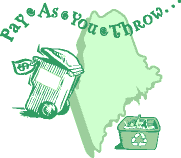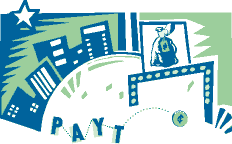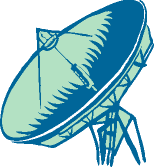PAYT Bulletin: Spring 2001
The PAYT Bulletin is designed to help solid waste planners and others get the latest pay-as-you-throw news and events. Use the links below to read articles from the Spring 2001 issue. To review other issues of the Bulletin, use the links on the right side of this page.
Other issues
- Could PAYT Offer Hope For New York City's Recycling Program? (Winter 2003)
- PAYT Helps Cities Protect Climate (Summer 2002)
- Large Cities and PAYT (Winter 2002)
- Bigger, Older, Wiser: (Summer 2001)
- Maine Turns to PAYT (Spring 2001)
- State and City Profiles (Summer 2000)
- PAYT From Sea to Shining Sea (Winter 2000)
- PAYT Bulletin Archives
- By Popular Demand: Maine Turns to PAYT
- Workshops Support Big-City PAYT Efforts
- PAYT Grantee Update
- Free Resources
By Popular Demand: Maine Turns to PAYT

"We were a bit surprised that people were talking about it," said Sam Morris, senior planner at Maine's State Planning Office. "We weren't expecting residents to be this supportive of PAYT, especially when they raised issues like the program's greater fairness and its environmental benefits. They were talking about the future—about their children—when they decided to speak up."
PAYT has grown significantly in Maine in the past few years—up to 128 programs from fewer than 50 in 1995—in response to several developments. Cities and towns alike began to notice the potential to contain or even reduce solid waste management costs with user-based fees. In addition, recycling programs in the state have grown to the point where 90 percent of all residents have access to recycling, which lead communities to begin looking for ways to increase participation rates.
But one of the driving forces was the interest and, often, enthusiasm of neighbors in Maine to adopt a program that they saw as both greener and fairer. Morris explained that his office was often asked by local boards of selectmen or city councils to attend local hearings or town meetings where a proposed PAYT program was under discussion. Anticipating that residents might at first react negatively to the idea of paying directly for their trash, he expected at these meetings to have to lay out all the reasons why PAYT was better for both residents and the community as a whole. Instead, Morris often found people standing up immediately to voice their support for a program that they saw was likely to increase recycling amounts.
In many cases, these residents had been using recycling programs for a few years, and recognized that the next step to protect the environment was to involve more people. User fees just made sense to them. Just as important, they saw the program as more equitable, because paying by the bag or can would let them control their own costs (and not pay for their neighbor's trash, if they chose not to recycle). Of course, there often were residents at the meetings who were skeptical, but Morris was pleased with the overall level of support people were offering.
For many Maine cities and towns, this public approval gives local decision-making boards the political boost they needed to sign off on PAYT, a program increasingly supported by solid waste departments. The buzz about PAYT has been spreading among Maine's community waste management officials, who see the economics of per-can or per-bag fees as just making more sense.
The cost of trash disposal in the state hovers around $50 per ton on average, with some communities paying more than $75 per ton. Most of this waste goes to one of five waste-to-energy (WTE) incinerators; two large commercial landfills and about a dozen small ones take up the remainder. Typically, the cost of sending collected recyclables to regional recycling facilities is lower, often around $5 to $10 less per ton. In Portland, which implemented PAYT in 1999, the difference is $30 per ton. And "put-or-pay" agreements, under which a community is required to supply a certain amount of trash or pay a penalty, aren't a concern for Maine city or town WTE contracts—the amount they must supply is usually small, and can be in the form of either trash to the incinerator or recyclables to the processing facility. In fact, trash amounts allowed to be sent to the WTEs are often capped at a certain level—creating a further incentive for communities to aggressively promote recycling. As a result, communities in Maine are implementing PAYT to help them contain costs, increase their recycling rates, cut overall trash disposal amounts, and better serve their residential customers.
So far, it seems to be working. In Portland, the recycling rate shot up to 35 percent from 7 percent in the year after they introduced combined PAYT and curbside collections. Other communities also have seen strong results. Supporting much of this has been Morris's State Planning Office, which has a staff person dedicated full-time to PAYT outreach and technical support. The office also runs a series of regional conferences throughout the state each year to help get out information and ideas about user fees. Throughout each city's or town's decision-making process, Morris emphasized, his approach is to remain neutral and provide information as needed. "Our job is just to explain the facts about PAYT," he added. "And if a community sees the benefits and elects to move ahead with it, we're there as a resource for them."
For more information on PAYT programs in the state of Maine, contact 207 287-8054.
Workshops Support Big-City PAYT Efforts
As part of the continuing American Big Cities (ABC) Campaign to encourage the growth of PAYT around the country, the U.S. Environmental Protection Agency (EPA) and the International City/County Management Association (ICMA) have co-sponsored a series of technical assistance workshops around the country to target large populations for education about the implementation of successful PAYT programs. Some of these cities are well on their way to program implementation, while others are just recognizing that PAYT could be a viable option for helping them manage their solid wastes. Depending on the stage they are at in the planning process, EPA has been providing these cities with a variety of support, ranging from facilitating informational workshops with stakeholder groups to helping cities devise implementation plans and time lines.
Cities up North See the Light 
Over the past year, as part of this ABC Campaign, EPA convened workshops in both Ann Arbor, Michigan, and Lowell, Massachusetts, a large suburban community about 30 miles northwest of Boston. Both cities requested 1-1/2 day technical assistance workshops involving participation of various community stakeholders. The hands-on sessions included brainstorming, identification of key issues and concerns, and case studies from other urban PAYT cities.
According to Bryan Weinert, the manager of resource recovery for the city of Ann Arbor, "Ann Arbor's workshop provided a first-of-its-kind opportunity for solid waste financing to be discussed among interested stakeholders without the pressure of deficits or a looming crisis staring us in the face. An honest and reasoned assessment of PAYT was therefore possible, and I can't help but think Ann Arbor will the better for it."
The workshop in Lowell took on a different format. In recent years, Massachusetts has witnessed rapid growth in the number of communities adopting PAYT programs. This workshop, which was co-sponsored by EPA and the Massachusetts Department of Environmental Protection (MDEP), was aimed at a number of larger Massachusetts municipalities that are considering PAYT as a solid waste management option. Through various presentations, the 19 attendees representing city governments throughout the state learned about how PAYT works, options for program design and rate structure, and how PAYT can be effectively funded. In a lively Q&A session, workshop participants indicated a high level of interest in PAYT.
On the day prior to the workshop, John Gibson, a Seattle expert in the economics of solid waste management, met with Lowell city staff to discuss full-cost accounting and rate design. According to Joseph Lambert, PAYT program and grants manager with MDEP, "We got the large city audience we were looking for. The attendees included finance directors, Department of Public Works superintendents, and city managers, exactly the level we need at these workshops."
Hopping on the PAYT Bandwagon Down South
The technical assistance efforts in two large southern cities-Fort Worth, Texas, and New Orleans, Louisiana-included an overview of PAYT but focused primarily on rate structure design options and considerations and developing implementation time lines. To smooth the way toward PAYT, both cities convened strategic planning sessions with key implementers and decision-makers to wrestle with their key barriers.
In addition, John Gibson met with several key solid waste officials in separate sessions to gain a better understanding of the economic considerations. As a result of his discussions with these groups, Mr. Gibson was able to provide feedback and suggestions to the larger group of attendees on different rate structure options for the cities.
With EPA and ICMA's assistance, both cities are planning PAYT programs to determine if citywide implementation will work.
PAYT Grantee Update
Region 1-New Hampshire Governor's Recycling Program (GRP)
Under a U.S. Environmental Protection Agency (EPA) grant issued in 1999, the GRP developed a beta version of a software program called PriceSetter, which is designed to assist municipal officials in small communities to estimate PAYT rates for bag programs. The program uses data that communities readily have on hand and provides the ability to increase or decrease variable parameters such as tipping fees, hauling fees, or waste reduction rates to develop various PAYT pricing scenarios over a five-year period.
Under an earlier EPA grant, the GRP promoted and tracked PAYT activity in New Hampshire and conducted instructional workshops throughout New Hampshire, Maine, and Vermont. During the course of this grant, the GRP realized that one of the major challenges facing municipal officials in implementing PAYT was determining a price per bag. As luck would have it, GRP staff learned of the Ratemaker software while conducting research for the workshops. After attending an EPA-sponsored workshop highlighting the Ratemaker software and subsequently using the tool first hand, the GRP determined that it was geared more toward larger communities, not small communities such as those in New Hampshire. Consequently, it began developing a comparable software program that would benefit smaller communities.
The GRP's efforts resulted in the PriceSetter software. In 1999, the GRP applied for and received a second grant from EPA to finalize the development of the software and promote the program nationally. The GRP completed the beta version and sent it to an industry-specific review team comprising local, state, and federal officials. The most significant change made as a result of the review was the conversion of the program from Microsoft Excel to Visual Basic format, which will allow users to download the program and use it without any special software program.
The GRP anticipates completing the final version of the PriceSetter program by mid-2001. Simultaneous with the release of PriceSetter, the GRP will promote a PriceSetter-specific Web site that will allow the program and a "how-to" guide to be downloaded (at no cost) directly from the site. The Web site will also provide links to other PAYT sites and enable visitors to ask questions, make suggestions, and share information. For more information on the GRP's PriceSetter program, contact Todd Ellis.
Region 4-North Carolina Division of Pollution Prevention and Environmental Assistance (DPPEA)
Since 1999, DPPEA has been providing direct technical assistance and grant funding to North Carolina communities that need help implementing PAYT programs. DPPEA is working with two communities (the city of Charlotte and Mecklenburg County) to help them implement PAYT, but expects to have worked with 10 by the end of the grant period. Based on the average size of the communities under consideration, DPPEA expects to increase the population served by PAYT programs in North Carolina by more than 450,000.
DPPEA hopes that the addition of 10 new PAYT communities in the state will provide a significant increase in examples for other state communities to follow. To further improve waste reduction in the state, DPPEA has been encouraging project communities to add backyard composting programs and expand the number of materials collected as part of their recycling programs. According to James Hickman, project manager for the program, "these activities will help maximize the efficiency of the PAYT systems, both in terms of waste reduction and greenhouse gas offsets."
In addition to direct technical assistance, DPPEA has created a listserver and Web site that serve both North and South Carolina. The listserver is a group e-mail service that lets individuals interested in or already involved with PAYT post questions to their peers, while the Web site provides a host of information and resources available to potential and existing PAYT communities. Furthermore, based on information obtained during the course of the project, DPPEA will develop an in-depth guidance document to assist other communities that want to switch to PAYT and a document that analyzes how PAYT affects communities in North and South Carolina.
For more information on DPPEA's project, contact James
Hickman at 919 715-6528 or . You can also visit the Web site
DPPEA developed ![]() .
.
Free Resources
On December 7, 2000, EPA's Climate and Waste
Program-in partnership with several national  solid waste and
governmental organizations-broadcast a nationwide satellite
forum entitled Why Waste a Cool Planet: MSW Solutions for
Global Climate Change. This interactive program was dedicated
to helping educate businesses and state and local governments
about the relationship between solid waste management and
climate change.
solid waste and
governmental organizations-broadcast a nationwide satellite
forum entitled Why Waste a Cool Planet: MSW Solutions for
Global Climate Change. This interactive program was dedicated
to helping educate businesses and state and local governments
about the relationship between solid waste management and
climate change.
You can order a free copy of the video Pay-As-You-Throw: A New Trend in Solid Waste Management online or by calling the PAYT Helpline at 1-888-EPA-PAYT
![[logo] US EPA](../gif/logo_epaseal.gif)